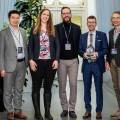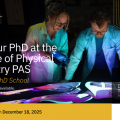Dreaming big about the smallest things: Dream Chemistry Award 2020
Reading time: about 4 minuts

On the 1st of December, the jury has announced the winner of this year's Dream Chemistry Award. Because of the pandemic restrictions, the whole event has been carried online.
The Dream Chemistry Award and 10000 euro prize went to Claudia Bonfio (MRC Laboratory of Molecular Biology and University of Cambridge) for a dream about understanding the origins of chemical communication at the origin of life. The laureate captured the jury's heart with her presentation on tracing the origins of communication to the earliest cells existing on Earth. She proposed the innovative way of recreating such primitive entities in the lab and then "listen" chemically to how they exchange information. Although her dream seems detached from everyday life, it may give us powerful tools, e.g. in the fight against cancer. As she explained: "We know that cancer cells release molecules into the environment to communicate with recipient cells, for example, to promote metastasis". Blocking the communication might stop cancer from proliferation. But first we have to understand it at the basic level of artificial cells. This dream could also allow us to develop artificial cells that can communicate with pathogens, providing, for example, a way to prevent infections”.

Claudia Bonfio, Dream Chemistry Award Winner.
Ivana Drienovska (Vrije Universiteit) dreams about making fluorinated compounds as catalysts with new reactivities. As she described: "The idea of this project is to be able to perform fluorination reactions on a whole set of compounds, with particular attention to substrates used in pharmaceutical industries. I want to exchange some of the current methods, requiring harsh, harmful to the environment, chemical steps, for enzymatic processes. This way I can get a whole new set of artificial, eco-friendly, catalytic enzymes".
Paweł Dydio (Universite de Strasbourg, ISIS) wants to utilize artificial intelligence for engineering networks of reactions. All reactions would act in parallel within the network, as in "real" biological reactions. Creating such a chemical "black box" would enable chemists to use the energy of one process to propel another or to eliminate the need to stabilize intermediate products. Machine learning would tell us which reactions work in concerto in such networks.
Yunyan Qiu (Northwestern University) dreams to develop a chain-growth controlled polymerization protocol aided by catalytic artificial molecular machines consisting of macrocyclic ligands. "This chain-growth polymerization method can lead to a drastic improvement of materials’ properties by controlling the length, composition, and topology of the resulting polymers," says Yunyan Qiu. “I am hoping, through the use of advanced molecular machines, to produce precise synthetic polymers with complete control over monomer sequences, achieving the holy grail of polymer synthesis." We should keep our fingers crossed for success as it would lead to new materials with improved performance. Simultaneously, well-defined length, composition, and topology could potentially mitigate polymer batch-batch variation, thus reducing the waste production.
All of us who are wine, beer, or coffee lovers listened with great interest to the presentation of Christopher Hendon (University of Oregon). His dream is to improve the taste of bad beverages using electrochemistry. Oxidation and reduction allow for eliminating the unpleasant effects of unwanted chemical compounds that appear in our beverages. The success of his dream would allow us to enjoy a bottle of liquor or espresso with more certainty as to its flavour.
The online transmission is available on youtube "Dream Chemistry Award 2020". https://www.youtube.com/watch?v=DW5PZ_JlANQ and https://www.youtube.com/watch?v=JPyRJDlVF2g
Scientists who obtained their PhD no more than 8 years ago are eligible to compete for the Dream Chemistry Award. A condition for accepting the application is the nomination of a candidate by a researcher with a PhD or higher degree and at least 10 years of experience in science or natural science. The decision on the award is made by the Scientific Committee composed of 18 professors of the best Polish scientific institutions specializing in chemistry, physics, biology, medicine and materials engineering. The Honorary Committee of the Dream Chemistry Award competition includes the following renowned chemists: the Nobel Prize winner Professor Richard Schrock (MIT), Professor Krzysztof Matyjaszewski (Carnegie Mellon University), Professor Josef Michl (University of Colorado Boulder and IOCB Prague) and Professor Bartosz Grzybowski (Uslan National Institute of Science and Technology and IOC PAS).
Last year's DCA prize, awarded in Prague, was won by Dr. Yujia Qing from the University of Oxford, for a project devoted to the development of new methods and tools for sequencing all biopolymers present in living cells. Her dream was presented in Nature Chemistry Editorial material at https://www.nature.com/articles/s41557-020-0451-2?proof=t .
More details about the competition can be found at www.dreamchemistryaward.org.
- Author: prof. dr hab. inż. Robert Hołyst, prof. Pavel Jungwirth
- Date: 8.12.2020





